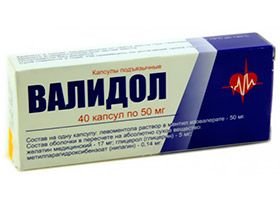
All iLive content is medically reviewed or fact checked to ensure as much factual accuracy as possible.
We have strict sourcing guidelines and only link to reputable media sites, academic research institutions and, whenever possible, medically peer reviewed studies. Note that the numbers in parentheses ([1], [2], etc.) are clickable links to these studies.
If you feel that any of our content is inaccurate, out-of-date, or otherwise questionable, please select it and press Ctrl + Enter.
Validol
Medical expert of the article
Last reviewed: 03.07.2025

Validol is a combined sedative and belongs to the pharmacological group of psycholeptics - sedatives. In fact, this drug is related to drugs for the treatment of diseases of the nervous system.
Validol also has a reflex vasodilation effect (reduces the tone of the vascular walls and promotes the expansion of the lumen of the vessels), and on this basis this drug has the code C01EX (other combination drugs for the treatment of heart disease). However, it should be taken into account that according to the mechanism of action, Validol is not a cardiac drug and relieves spasm pain without treating myocardial ischemia.
Other names: Corvalment, Cormentol, Valofin, Menthoval, Menthylisovalerat.
ATC classification
Active ingredients
Pharmacological group
Pharmachologic effect
Indications Validol
First of all, Validol is prescribed for the treatment of anxiety disorders and panic attacks; this symptomatic drug can also be used for neurasthenia, uncontrollable hysterical states, neurocirculatory dystonia, kinetosis (nausea due to motion sickness in transport), pain in the heart area (caused by cardiovascular reflexes that occur in various psycho-emotional states).
The instructions indicate that Validol can be used to relieve an attack of angina, but in cardiology, antianginal drugs from the nitrate group (nitroglycerin, etc.) are used for this purpose.
Pharmacodynamics
The pharmacodynamics of Validol is provided by its active substance - a solution of menthol in methyl ester of isovaleric (3-methylbutanoic) acid, which affects the plasma membranes of the cells of the oral mucosa and stimulates its nerve receptors according to the principle of allosteric modulation of enzyme metabolism.
In response to receptor stimulation, the synthesis of endogenous polypeptide neurotransmitters increases within a few minutes. In particular, opioid peptides endorphin and enkephalin stabilize the emotional state (calm) and reduce epicritic pain (during an angina attack); bradykinin dilates blood vessels (including coronary vessels), etc.
 [ 3 ]
[ 3 ]
Dosing and administration
A tablet or capsule of Validol should be placed under the tongue; the drug in liquid form is applied five drops on a piece of sugar, which (as in the case of a tablet) should be kept in the mouth until completely dissolved.
The maximum daily dose is 200-240 mg.
 [ 7 ]
[ 7 ]
Use Validol during pregnancy
Use during pregnancy is considered acceptable. But it should be borne in mind that menthol is contraindicated for pregnant women (the official instructions for Validol do not mention this), since the use of mint essential oil affects the level of sex hormones.
Contraindications
Validol is contraindicated in cases of menthol intolerance, low blood pressure, and acute cerebrovascular accident (stroke).
Validol is not used in children (under 12 years of age).
 [ 4 ]
[ 4 ]
Overdose
Exceeding the daily dose of Validol causes CNS depression, nausea and vomiting.
 [ 8 ]
[ 8 ]
Storage conditions
Validol is recommended to be stored at a temperature of +15-20°C.
 [ 12 ]
[ 12 ]
Shelf life
4 years.
Manufacturer
Attention!
To simplify the perception of information, this instruction for use of the drug "Validol" translated and presented in a special form on the basis of the official instructions for medical use of the drug. Before use read the annotation that came directly to medicines.
Description provided for informational purposes and is not a guide to self-healing. The need for this drug, the purpose of the treatment regimen, methods and dose of the drug is determined solely by the attending physician. Self-medication is dangerous for your health.

